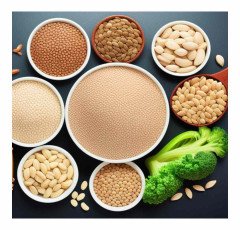
The importance of protein and fiber in your diet

A balanced and healthy diet must contain both protein and fiber. They are essential to preserving general health and wellbeing. Let's delve deeper into their significance:
The significance of protein
The building blocks of muscles are proteins, which help muscles to grow and repair. Your muscles sustain little tears during physical activity or exercise that need to be healed and regenerated. The essential amino acids for this repair process are provided by protein, which supports muscle growth and recovery.
The value of fiber
Including Fiber and Protein in Your Diet
Tips for Including Fiber and Protein in Your Diet
Water is essential for both protein and fiber to function properly in the body, so make sure you drink plenty of it.
Important Points to Keep in Mind
Essential nutrients that promote numerous areas of health include protein and fiber.
Your overall health and ability to sustain a healthy lifestyle can both benefit from a balanced diet that consists of a variety of whole foods that are high in fiber and protein. Always put a diversified and balanced diet first, and if you have any particular dietary issues or health goals, speak with a doctor or a qualified dietitian.
Satiety and Weight Management (Continued)
Protein and fiber combine to make you feel more satisfied and full. By encouraging the production of satiety hormones including peptide YY (PYY) and glucagon-like peptide 1 (GLP-1), high-protein diets can aid with appetite control. Furthermore, fiber expands in the stomach and slows down digestion, which also helps people feel fuller for longer after eating. Appropriate protein and fiber intake can aid in calorie management, which is crucial for weight maintenance and weight loss attempts, by boosting satiety.
Blood Sugar Control (Continued)
Including protein and fiber in meals can help manage blood sugar levels in those who already have diabetes or are at risk of developing type 2 diabetes. Protein slows down the digestion of carbohydrates, reducing the likelihood of sharp increases in blood sugar. Fiber also helps to stabilize blood sugar levels by delaying the absorption of sweets. These nutrients can lower the risk of insulin resistance and type 2 diabetes by controlling blood sugar.
Management of Cholesterol
Soluble fiber, in particular, is essential for controlling cholesterol levels. In the intestines, it binds to cholesterol and bile acids to limit their reabsorption and encourage their excretion through feces. By lowering LDL cholesterol levels, this procedure lowers the chance of developing cardiovascular illnesses.
Fiber-rich meals help to maintain regular bowel movements and ward off constipation, supporting a healthy colon. Additionally, several forms of fiber, including fermentable fiber and resistant starch, provide food for good gut microbes. Short-chain fatty acids, which are produced when these bacteria ferment fiber and have anti-inflammatory effects on the colon, may lower the risk of colon cancer.
Bone Health
Protein is important for supporting the health of bones in addition to muscles. The framework for bone density and strength is provided by the structural protein collagen, which is found in bones. A sufficient protein diet promotes bone remodeling and lowers the incidence of fractures and osteoporosis.
Immune System Support (Continued)
Protein is important for the immune system's support. Proteins such as antibodies, immunoglobulins, and other immunological elements all aid in defending the body against illnesses and infections. A healthy immune system is essential for overall wellbeing and pathogen protection.
Protein is essential for muscle repair and recovery in people who regularly engage in physical activity. The body breaks down muscle protein after exercise, therefore eating protein after exercise aids in muscle repair and the growth of new muscle tissue, which improves athletic performance and speeds up recovery.
A balanced eating strategy should include protein and fiber because they provide numerous health advantages. Planning your meals should take into account your specific requirements, health objectives, and any dietary restrictions or food allergies. You can improve your general health and well-being while consuming a variety of delectable and nutritious meals by adopting a varied and nutrient-rich diet. Remember to seek out individualized advice and suggestions based on your particular situation from a healthcare practitioner or registered dietitian.
Protein and fiber are both beneficial for maintaining a healthy gut environment.
Prebiotic fiber acts as food for the good bacteria in the gut. Short-chain fatty acids (SCFAs) including butyrate, acetate, and propionate are produced as a result of these bacteria's colonic fiber fermentation. In order to keep the gut healthy, reduce inflammation, and promote overall digestive health, SCFAs are crucial. increased nutritional absorption, increased immunological performance, and a lower risk of gastrointestinal illnesses are all associated with a healthy gut flora.
Protein and carbohydrates high in fiber can both assist maintain steady energy levels throughout the day. They slow down the digestion and absorption of glucose when ingested combined, resulting in a more gradual and sustained release of energy. This constant source of energy can aid in avoiding energy dumps and encourage improved concentration and productivity.
Maintaining Lean Body Mass
Maintaining lean body mass requires an adequate protein intake, particularly during times of weight loss or calorie restriction. Your body may break down muscle protein for energy when you eat less calories. Lean muscular tissue preservation and this impact can both be aided by eating enough protein.
Metabolic Rate
When compared to carbohydrates and lipids, protein has a larger thermic effect of food (TEF). This implies that processing and digesting protein requires more energy from the body. Consequently, consuming more protein can modestly boost your metabolic rate, which may be advantageous.
Protein and fiber both help you feel fuller longer and maintain healthy eating habits. Satisfaction following a meal might lessen the desire for unhealthy, high-calorie snacks, resulting in better overall eating selections. Your ability to resist the temptation of unhealthy, processed meals can be increased by including protein- and fiber-rich foods in your diet.
Combination of foods high in protein and fiber
Including both protein and fiber in your meals is a great way to benefit from both. For a balanced and healthy lunch, for instance, you could have a salad with leafy greens, grilled chicken (for protein), and some chickpeas (for fiber).
As with any nutrient, moderation is essential. Individual needs should also be considered. Although both fiber and protein are necessary, eating too much of either can be harmful. To fulfill your unique demands, aim for a balanced diet that consists of a variety of nutrient-rich foods.
In addition to helping digestion and muscle growth, protein and fiber also improve heart health and help people control their weight. You can promote your general health by eating a balanced diet that includes a variety of nutrient-dense foods. This can assist ensure you get enough protein and fiber. Always remember to adjust your diet to meet your unique needs, tastes, and health objectives. For individualized advice, speak with a healthcare provider or registered dietitian.
Blood Pressure Control
Getting enough protein and fiber in your diet will help you maintain healthy blood pressure levels. Studies have demonstrated that diets high in plant-based protein, such as that found in legumes, nuts, and seeds, are linked to lower blood pressure. Further promoting cardiovascular health is the soluble fiber present in oats, barley, and beans, which has been connected to mild drops in blood pressure.
Bone Health
Protein helps the body better absorb calcium and is crucial for maintaining bone density. Your body releases hydrochloric acid, a stomach acid, when you eat protein. As a consequence of helping to break down the protein, this acid also makes calcium from food available for absorption in the intestines. This method can improve calcium absorption and promote improved bone health.
Blood Lipid Balancing
In addition to lowering LDL cholesterol levels, fiber can assist in maintaining healthy levels of other blood lipids, including triglycerides. A higher risk of cardiovascular disease is linked to high triglyceride levels. To further improve heart health, including fiber in your diet to help keep triglyceride levels under control.
Protein from different sources has various sets of amino acids, according to the amino acid profile. The building blocks of proteins, amino acids have several functions in the body. The wide variety of essential and non-essential amino acids found in various protein sources are necessary for the creation of enzymes, hormones, and other significant compounds.
A diet high in protein and fiber, along with other nutrient-dense foods, has been associated with a longer life expectancy and a reduced risk of chronic diseases like type 2 diabetes, cardiovascular disease, and several types of cancer. These nutrients can support general health, which can lead to a longer, healthier life.
Maintaining muscle mass is crucial as we age to avoid sarcopenia, which is the age-related loss of muscle. A diet high in protein together with regular exercise can help seniors stay stronger and more independent as they age since protein is essential for maintaining muscular tissue.
Mental health
By encouraging a steady blood sugar level and offering vital amino acids required for the synthesis of neurotransmitters, protein and fiber might indirectly improve mental health. Serotonin is a neurotransmitter that is essential for mood management and general mental health.
Disease Recovery and Surgery
The body needs extra protein and nutrients during illness or recovery from surgery in order to boost the immune system and repair damaged tissues. Consuming enough protein and fiber helps speed up the body's healing process and aid in recovery.
Personalized Dietary Options
Depending on your age, gender, level of exercise, and health problems, the recommended ratio of protein to fiber in your diet can change. The advantages of these vital nutrients can be maximized by customizing your dietary choices to your individual requirements.
A healthy diet must include both protein and fiber since they each promote a variety of aspects of health and wellbeing. You may improve your overall nutrition, control your weight, promote heart health, and improve digestion by adding a mix of protein- and fiber-rich foods in your meals. Protein and fiber, when included in a balanced diet, help people live robust, active lives. Never forget to seek out specialized nutritional guidance and suggestions from a qualified dietitian or healthcare professional depending on your particular health situation and goals.











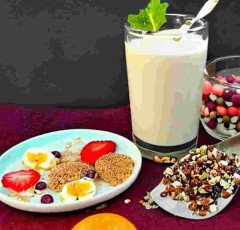
















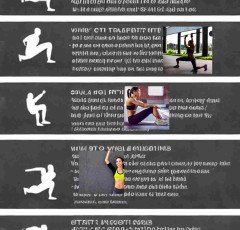






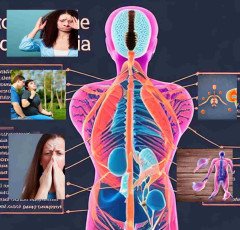

























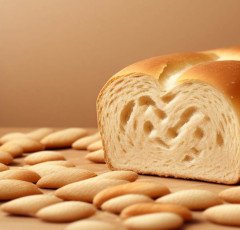


















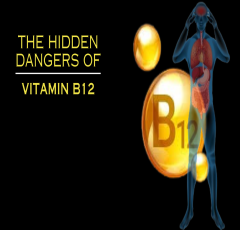






 RPM 3.0
RPM 3.0  TitTok Revolution
TitTok Revolution  One World Collection
One World Collection  Best Robotic Vacuum Cleaners
Best Robotic Vacuum Cleaners  Online Marketing
Online Marketing  Unreal Engine 5 For Beginners Learn The Basics Of Virtual Production
Unreal Engine 5 For Beginners Learn The Basics Of Virtual Production  BEST SELLER TOP10
BEST SELLER TOP10  NordLocker
NordLocker  Top Rated From Amazon
Top Rated From Amazon  The Secret Email System
The Secret Email System  Best Selling Books
Best Selling Books  Unlimited access to classes on illustration, photography, design, film, music
Unlimited access to classes on illustration, photography, design, film, music  Women Fashion
Women Fashion  1150+Trendy kids coloring pages Bundle
1150+Trendy kids coloring pages Bundle  Smart Doorbell
Smart Doorbell  Graphics & Design
Graphics & Design  SEO Checklist
SEO Checklist  All Wireless Products
All Wireless Products  Artificial Intelligence
Artificial Intelligence  Only For The United States
Only For The United States  Acer Laptop
Acer Laptop  Best Sellers On Amazon
Best Sellers On Amazon  ELECTRONIC ACCESSORIES
ELECTRONIC ACCESSORIES  ASPINAL LONDON
ASPINAL LONDON  Sennheiser
Sennheiser  Hello Theme
Hello Theme  Favorite Company (Cuelinks)
Favorite Company (Cuelinks)  NordVPN
NordVPN  Creative Brief For Video Shoot
Creative Brief For Video Shoot  SOFAS
SOFAS  ASUS Laptop
ASUS Laptop  The Click Engine
The Click Engine  Best Home Appliances
Best Home Appliances  Hot Bags For Pain Relief
Hot Bags For Pain Relief  NordPass
NordPass  Online Technology Classes
Online Technology Classes  Amazon Best Selling Products
Amazon Best Selling Products  Men Clothing
Men Clothing 
















